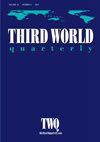印度的性别与城市贫困
IF 1.8
2区 经济学
Q2 DEVELOPMENT STUDIES
引用次数: 0
摘要
本文章由计算机程序翻译,如有差异,请以英文原文为准。
Gender and urban poverty in India
Abstract Poverty is a product of various deprivations. Gender discrimination is linked with deprivation in terms of socio-economic and political opportunities. This study explores the link between female-headship of a household and its vulnerability towards urban poverty. Further, the most vulnerable sub-sections among the urban female-headed households are identified. The study is based on the 68th round of Household Consumer Expenditure, and Employment and Unemployment Survey, India. Female-headed households were found to have higher odds to be urban poor as compared to their male counterparts. However, this gender-based difference in odds to be urban poor disappears once educational attainment of household-head is controlled for. This highlights that the discrimination in terms of educational attainment is major cause and solution to urban poverty among female-headed households. Further, female-headed households are not a homogeneous group and exhibit significant differences in their vulnerability to urban poverty across different socio-economic and demographic sub-groups. The negative impact of COVID-19 pandemic on female education in India is expected to create a long-term gender gap in terms of poverty. Thus, the public policy should stress on skill and educational attainment of females and target the poverty alleviation programmes on vulnerable sub-section of the female-headed households.
求助全文
通过发布文献求助,成功后即可免费获取论文全文。
去求助
来源期刊

Third World Quarterly
DEVELOPMENT STUDIES-
CiteScore
4.10
自引率
15.00%
发文量
137
期刊介绍:
Third World Quarterly ( TWQ ) is the leading journal of scholarship and policy in the field of international studies. For almost four decades it has set the agenda of the global debate on development discourses. As the most influential academic journal covering the emerging worlds, TWQ is at the forefront of analysis and commentary on fundamental issues of global concern. TWQ examines all the issues that affect the many Third Worlds and is not averse to publishing provocative and exploratory articles, especially if they have the merit of opening up emerging areas of research that have not been given sufficient attention. TWQ is a peer-reviewed journal that looks beyond strict "development studies", providing an alternative and over-arching reflective analysis of micro-economic and grassroot efforts of development practitioners and planners. It furnishes expert insight into crucial issues before they impinge upon global media attention. TWQ acts as an almanac linking the academic terrains of the various contemporary area studies - African, Asian, Latin American and Middle Eastern - in an interdisciplinary manner with the publication of informative, innovative and investigative articles. Contributions are rigorously assessed by regional experts.
 求助内容:
求助内容: 应助结果提醒方式:
应助结果提醒方式:


